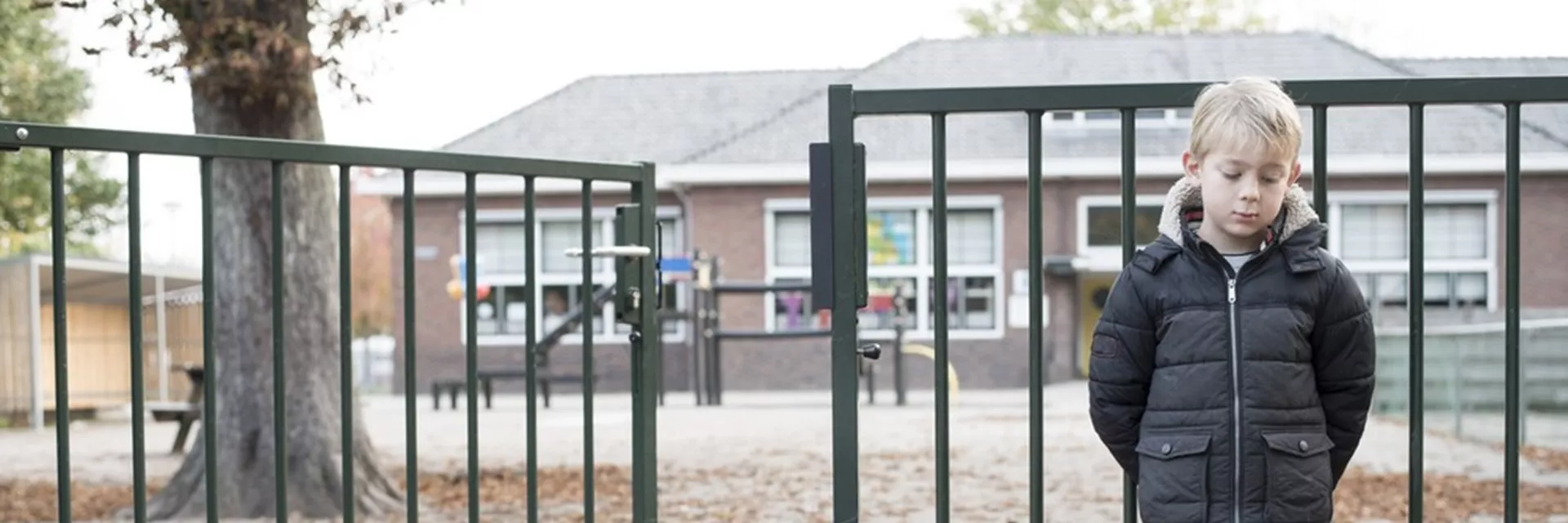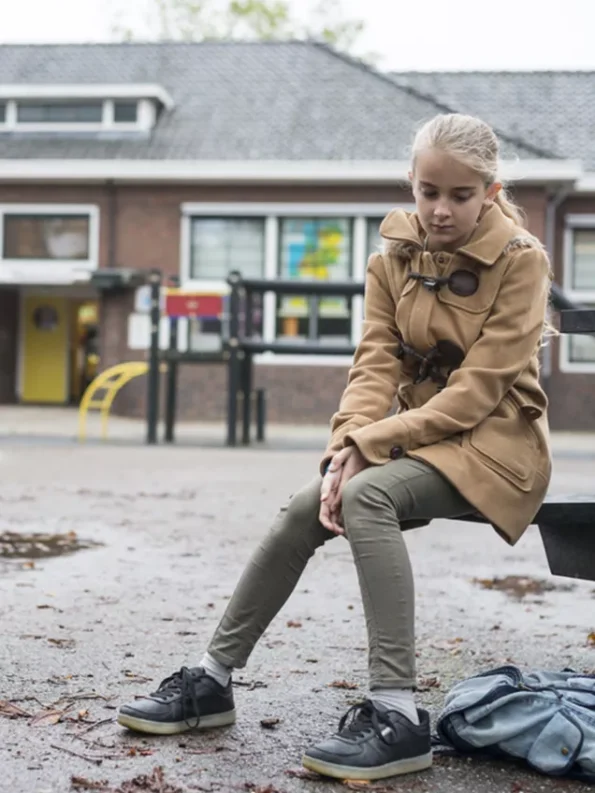
My child refuses to go to school
School refusal is a common challenge faced by foster parents but there are things you can do to help. Here’s everything you need to know…
Jump to:
“I don’t want to go to school” is one of the phrases that parents dread the most. If your child or teenager is refusing to go to school, you’re not alone and there are things you can do to help.
While a day or two at home may not be the end of the world, regular school refusal over many days, or even weeks, can hinder academic performance. The good news is that there are lots of things you can do to help your child return to school.
As a fostering agency with over three decades of experience in helping children in care reach their full academic potential, plus running our own specialist schools for children with social, emotional and mental health needs, it’s fair to say we know a thing or two about school refusal.
So let’s get started by taking a look at some of the most common reasons why children and teenagers refuse to go to school.
Why do children refuse to go to school?
We explore some of the most common reasons why a child may be refusing to go to school and some of the ways you can help below.
Anxiety
It’s perfectly normal for children to feel worried about some elements of school life from time to time. For example, they may feel anxious if they’ve got an exam coming up, after an argument with a friend, or when they’re returning to school after a break. But for some children, these feelings of fear and anxiety become so severe that they refuse to go to school altogether.
Some ways that a child might show us they’re feeling anxious about school are:
- They might be reluctant to get up and get ready for school
- They may worry about minor points like having the right equipment
- They may feel physically unwell such as headaches, stomach aches and nausea
- Their grades might drop or they may stop doing schoolwork
- Their behaviour may change – for example, they might be angry, upset or withdrawn
- They may skip school entirely without you knowing
How can you help?
If your child refuses to go to school and you think it might be due to anxiety, try speaking to them about what’s worrying them. Once you’ve listened to their concerns, you can talk about what you can do to help them.
You might find that it’s actually just certain elements of school life that are making them anxious, rather than everything about it. For example, they may be worried about spending break times alone, or that they’ll be asked a question in front of the class and won’t know the answer. By working together, and with the school, you can find ways to make your young person feel better about school.
It may also be useful to identify some grounding activities that will help your young person when they feel anxious at school. Activities can be as simple as imagining their favourite place, naming animals in alphabetical order, or squeezing something like a stress ball.
Bullying
Bullying – either at school or online – is another common reason why kids may not want to go to school. Sadly, it’s incredibly common with around one in five young people aged 12 to 20 experiencing bullying.
Bullying can be anything from emotional abuse, such as name-calling and spreading rumours, to being pushed, shoved, spat on or physically harmed in any other way.
A young person may not tell you that they’re being bullied because they may feel ashamed, helpless, or weak. They may also be worried that telling an adult will make things worse.
Some of the signs to look out for include:
- Unexplained injuries such as bruises
- Lost or destroyed clothing or personal belongings
- Changes in eating habits – for example, a loss of appetite or binge eating behaviours
- Difficulty sleeping
- Low mood
- Sudden loss of friends
- Withdrawal from social situations
- Decreased self-esteem
- Declining grades
- Self-destructive behaviours like running away from home, self-harm or suicidal thoughts
How can you help?
Bullying can take a huge emotional toll on young people, seriously impacting their mental health, and how they feel about themselves well into adulthood. Not to mention the barrier it can have on their learning. If your young person is refusing to go to school because of bullying then there are some things you can do.
Most importantly, it’s essential that you support your young person in how they’re feeling. You should also contact the school so they can investigate the issue, and create a plan to help your young person return to school. Your young person should also be included in these conversations. This will help them feel assured that you are doing everything you can to help them feel safe at school – both physically and emotionally.
You may also need to seek help from a professional, such as a GP, who may refer your child for counselling. If you’re fostering with ISP, then we will be able to arrange therapeutic support with one of our many in-house therapists whenever needed.
Difficult relationships with teachers or other adult members of staff
There are lots of reasons why a child or teenager may dislike a certain teacher or another adult member of staff – perhaps they find them irritating, boring, unfair, or even frightening.
But the reasons for disliking a teacher or another staff member may be far more complex for children in care. This is often due to their past experiences with adults, which can make their school experience incredibly distressing. They may not trust adults because they’ve been let down by them in the past, or perhaps a particular adult reminds them of a past abuser by the way they look, act or sound.
How can you help?
If you think this may be the reason why the young person in your care doesn’t want to go to school, then it’s important you speak to your social worker and the child’s school so you can find a way to support them moving forward.
There is no easy solution to help your young person overcome these feelings. It will take a lot of time, patience, and understanding from you and the school. They may also need specialist therapeutic support too.
If you foster with ISP, then your social worker, advisory teacher and centre therapist will be able to work with you, your young person and their school to find a way to move forward.
Lack of supportive friends
The fear of social rejection is huge, especially for teenagers. In fact, an MRI scan by the University of Michigan found that social rejection activates the same parts of the brain as physical pain, so it’s easy to see why a young person who has struggled to make friends or has fallen out with their friendship group, may not want to go to school.
How can you help?
There are lots of ways that you can help a child to flourish socially. You could encourage them to join a school club, like netball, music or drama. This will help them connect with other kids with similar interests to themselves, as well as build up their confidence in social situations. You could even reach out to another parent at the school to see if they would like to do something with you and your child at the weekend.
You may want to speak to the school to try to understand why your child is struggling with social connections. Are they keeping themselves isolated from others? Are they being excluded? Or is there another issue that you should be aware of? These are all things that their teacher should be able to help you understand.
The school might even be able to offer some extra support to help make school more enjoyable for your child. For example, they may agree on somewhere your child can go at break times if they feel alone, or buddy them up with another child at school.
Transition at school
Moving to a new school, year group or classroom can be stressful for some children, especially if they’re separated from friends or a favourite teacher. Transitions like these can also be particularly distressing for children with Autism Spectrum Condition (ASC).
Young people may be worried about what it’s going to be like. Or perhaps their first day in their new school or class didn’t go well, and they’ve come home feeling down and not wanting to return. For children with autism, the change of routine may be particularly challenging. All these things can cause a child to not want to go to school.
How can you help?
It’s quite common for children and teenagers to feel stressed and want to resist significant changes in their school routine. You can help to reduce their fears by preparing them in advance. So, take them to see their new school, meet their new teachers, and chat with some new classmates. This should make your child feel a little better about the next phase of their education.
This is slightly more challenging for children with autism; however, a proactive approach is still always better than a reactive one. To manage transitions for children, try to explain the changes well ahead of time – what will be different and what will be the same. You might even want to use a countdown to show when the change is going to happen, alongside other visuals, such as a timetable and photos of the new environment, so your child knows exactly what to expect and when.
Stressful events outside of school
Traumatic or stressful events that happen outside of school, such as the death of a loved one, can make a child not want to go to school. Although these are considered exceptional circumstances and absence would generally be authorised.
For young people in care, we also need to be aware of other stressful events that many find triggering, such as:
- Upcoming contact with birth family – or contact with mum or dad not going well
- Worries about family members they are not living with such as siblings
- Birthdays of loved ones
- Anniversaries such as the date they came into foster care or the death of a parent
- Events such as Mother’s Day or Father’s Day
- Changes in routine such as the run-up to Christmas
The distress of these events may last for a single day or be spread over several days, weeks, or sometimes longer.
How can you help?
Regular and good quality communication with your child’s school is vital in these situations. That way, you can plan ahead with the school to make reasonable adjustments that will help your child during this time. Teachers should also be made aware so that lessons and activities can be planned sensitively.
If your young person is feeling incredibly triggered and is completely refusing to go to school, speak to the school and also your social worker. The school might be able to make some alternative arrangements to help make your young person feel better about going in, or you might decide that a day out with some fun activities as a distraction would be better. Either way, being an advocate for your young person shows them that you understand their needs and are here to support them.
Struggling with work
A young person who’s struggling with schoolwork – either the volume or difficulty of it – may feel ashamed or embarrassed. They may even try to keep it a secret. If it goes unnoticed, they’ll continue to fall further behind their peers, which may exacerbate feelings of not being good enough. This can cause them to want to skip lessons or school completely.
It’s particularly common for children with learning difficulties, such as ADHD and dyslexia, to find schoolwork more challenging. There are also many young people with undiagnosed learning difficulties who may struggle with work.
Young people can be masters of masking their difficulties, which can make it incredibly difficult to spot when they’re struggling. That said, here are some early indicators that a child may be struggling with the work that’s being set for them:
- They spend a lot of time doing homework – much more time than you would expect
- They don’t want to talk about school and may actively avoid the topic
- They may begin to act out – either in lessons or at home, before or after school
- They may begin to describe school as ‘boring’ simply because they don’t understand it. Although it might also be because the work is too easy!
- They may show signs of depression such as loss of appetite and lethargy
- The child’s teacher may also raise concerns – this is often one of the latter signs
How can you help?
If schoolwork has gotten your young person so overwhelmed that they’re refusing to go to school, there are things you can do to help your child cope.
Firstly, speak to them about what they’re struggling with. Remain calm, non-judgemental and empathetic, and use open-ended questions. You can then speak to the school and agree on how you’re going to get your child back on track. For example, they may provide additional support in the classroom to check your young person has understood the work correctly, allow more time for them to digest the information before moving on, or adapt the difficulty or format of the schoolwork for your child.
There may also be ways you can support them outside of the classroom, such as one-to-one tutoring, homework club, and other activities that make learning fun again.
If you suspect your child has a learning difficulty, then you should also speak to a GP about getting a diagnosis.
Special Educational Needs and Disabilities
Children with Special Education Needs and/or Disabilities (SEND) may find being at school difficult for a whole range of reasons. A learning difficulty may make it difficult for a child to process and retain information, a physical disability may make them an ‘easy target’ for classroom bullies, and a child with autism may feel completely overwhelmed with anxiety and sensory issues. All of this can contribute to school refusal.
SEND are more common in children in care than the general population. In fact, about 60% of children in care will have SEN. This is often the result of complex trauma and difficult early experiences that affect brain development. Some may have been born with a learning difficulty or disability.
How can you help?
Schools should be providing young people with SEN support according to their individual needs. But you may also need to apply for an EHC plan if your young person needs more support than the school provides.
If your child already has an EHC plan but they’re consistently refusing to go to school, you should request an urgent review. This will help provide additional support for your young person and address some of the barriers that are stopping them from accessing education.
What to do when your child refuses to go to school
It’s important to stay calm when your child or teenager refuses to go to school – school refusal is very common, particularly in children and young people in care, and you are not alone.
Follow these steps to help get your child back into the classroom…

Inform the school
Firstly, let the school know that your child is refusing to go to school. They should be able to send over some work for your young person to complete, and also offer some advice on ways to support their learning while they’re not in school.
Listen to your child
Take the time to really understand why your young person is refusing to go to school. If your child is struggling to open up, try going for a walk or drive, or do an activity like baking where conversation can feel more natural.
Once you have a better understanding of what’s going on for your child, you can work with the school to make their transition back into the classroom as seamless as possible, while also providing them with some all-important reassurance.
Work closely with the school
You should be in constant communication with the school while your young person is not attending. You’ll also need to request a meeting with them as soon as possible. The aim of this meeting should be to discuss why your young person is refusing to go to school, and what the school can do to help.
The plan should focus on what the child can manage, and then build on that. Agree on adjustments the school can make to help alleviate some of your young person’s worries so they can return to the classroom.
If your young person has Special Educational Needs and/or Disabilities, and requires additional support that the school doesn’t provide in their standard offer, then you should also look to apply for an EHC plan.
Support your child’s learning
It’s important to continue to support your child’s learning while they’re out of education, and the school should help with this too. But remember, learning opportunities come in all different shapes and sizes, and don’t always have to be conventional classroom-based lessons.
Think creatively and lean into your child’s interests. For example, if your child enjoys baking, then you could set them a task to write a recipe card, illustrate each step and bake a cake, measuring ingredients as they go. It’s really about making learning fun again.
Of course, they will also need to complete some of the more traditional schoolwork too, particularly if your child is out of school for a little while. If possible, try to keep a separate workspace for schoolwork. An office is ideal, but a dedicated desk in a quiet room can also work.
Stick to a routine
Structure is really important for young people, and sticking to a routine will help make the transition back into school a little easier. But your routine doesn’t have to look like a school timetable. Instead, you could have blocks for daily outdoor exercise, practical learning activities, desk-based schoolwork, and break times.
Just remember your home is not school, and you are not a teacher. First and foremost, you are a parent or carer, and your child needs you and your home to be their sanctuary.
Encourage spending time with friends
Try to encourage your child or teenager to keep in touch with their school friends while they’re not going to school.
This could be by arranging play dates at your local soft play centre for younger children, or by seeing if your teenager would like to invite a friend over for dinner or to go to the cinema. By keeping these friendships alive, your young person’s transition back into the classroom should be a little easier.
School refusal support – what’s available to you
It can be stressful when your young person refuses to go to school. But just know that you are not alone, and there is lots of support and resources available to you.
Your child’s school should be a vital resource in helping you get your child’s formal education back on track. You can also contact your local authority so you can receive practical support from an Education Welfare Officer.
If you believe that a mental health condition may be contributing to your child’s refusal, then it’s a good idea to book an appointment with their GP. The doctor may refer your child to the Children and Young People’s Mental Health Services (CYPMHS) – formally known as ‘CAMHS’ – for further support.
If you’re fostering a child with ISP, then speak to your advisory teacher and social worker. They can provide lots of advice and practical support during this difficult time. Whether it’s by helping you with some of the day-to-day stuff, like one-to-one tutoring, or by arranging therapeutic support for your young person. Our team are always here for you.
Other resources that you might find useful:

How can teachers support students with school refusal?
There are lots of ways that teachers can help young people who are worried about going to school.
Firstly, it’s really important to listen to the child without any judgement. They need to feel safe when they open up to you, and that you’re on the same side. Relationships really do matter, and the child will feel much more assured if they don’t feel alone.
As well as working on forming a trusting relationship, you could agree on a safe and quiet space where they can go if they need to. This could be used during break times if they feel lonely, or during class time if things become too much. During lesson time, you could also agree on a subtle way in which the young person can access this space, such as a ‘time out’ card. This is particularly useful if they’re struggling in the environment but don’t want to draw attention to themselves. Also, lessons will seem far less daunting if they don’t feel trapped.
The key really is to listen to the child, understand their triggers, and help them to feel, safe, secure and not alone while they’re in school.
Education Hub

Help a child go back to school
Many children in care will miss parts of their education. Here’s how you can support their transition back into school.

My child’s been excluded
Don’t worry, you’re not alone. Here’s what you need to do if a child in your care has been excluded from school.

Education, Health & Care Plans
Everything you need to know about EHCPs including who’s eligible, what the plan covers, and how to apply.
